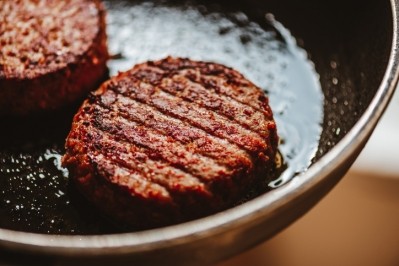RollinGreens’ plant-based bowls prioritize shelf-stable convenience

Each 2.5 ounce bowl contains RollinGreens’ plant-based protein, ME’EAT or CHIC’KEN, in addition to rice, vegetables and seasonings. The bowls come in four flavors: ME’EAT Classic Chili Bowl, ME’EAT Mexican Rice Bowl, CHIC’KEN Stir Fry Rice Bowl and CHIC’KEN Teriyaki Rice Bowl. Consumers are directed to add water and microwave the bowls for three minutes.
Each bowl contains 23 grams of protein. CHIC’KEN’s protein composition contains a texturized pea protein blend of pea, rice protein fermented from shiitake mushroom, pea protein and pea fiber. ME’EAT is made with pea protein. All four bowls are gluten-free, soy-free, certified non-GMO and Kosher.
RollinGreens launched the bowls on its website earlier this week with plans to launch into retail in July.
From foodservice, Shark Tank to expanding into more than 4,000 retailers
The duo started the business from a food truck in 2011 serving the Boulder, Colo. community at farmer’s markets and catering events. The company rolled out its line of frozen Millet Tots and Cauliflower Wings five years later into retail and was able to expand the company after appearing on Shark Tank in 2020.
By 2021, Rollin Greens developed its shelf-stable line with the introduction of Ground Taco ME’EAT and two years later, ME’EAT and CHIC’KEN were available in more than 4,000 stores nationwide.
The company’s transition into retail was due to the success of its foodservice offerings and the deal with Robert Herjavec on Shark Tank, Cunningham said.
“With the success of our food truck came the demand from consumers to be able to purchase our products in stores. There will always be some difference from making a fresh item to order vs. a packaged product, but the taste and quality we were able to achieve manufacturing our products were great from the start,” Cunningham said.
She continued, “We worked tirelessly to make it a scalable product. Once in market, we saw great turns on shelf, which led to more retailers and ultimately led to a successful appearance on Shark Tank that really catapulted the national interest in our brand.”
[Editor’s note: Learn more about how plant-based products are performing, including what types of products consumers are looking for and merchandising strategies to better engage shoppers at FoodNavigator-USA’s upcoming free webinar – Plant Based 3.0: Emerging from the trough of disillusionment, on May 29. Get all the details and register HERE.]

















